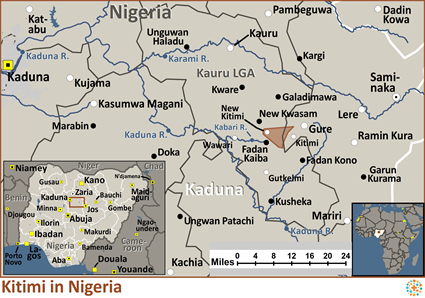The Kitimi are a small group of agricultural people who live in central Nigeria. In Nigeria the Hausas and Fulanis have merged to become the most powerful people in northern Nigeria. Smaller people groups like the Kitimi are merging with them. As that process continues, the Kitimi people will probably lose their own language and culture and adopt folk Islam like the Hausa-Fulani. The Kitimi's language of Tumi is endangered. Young people prefer to speak the Hausa and English they learn at school. Only gospel recordings are available in the Tumi language. Many of the Kitimi adults are illiterate so the gospel needs to be presented to them in audio and visual forms.
The Kitimi are in Lere LGA of Kaduna State in north-central Nigeria.
The primary occupation of the Kitimi is farming. They grow rice, maize, millet, beans, bananas, melons, and vegetables. Peanuts, kola nuts, and palm oil are cash crops which provide funds for the Kitimi to buy things they cannot make for themselves like cell phones and appliances. Most families also raise chickens, goats and cattle to supplement their diets. Village elders settle legal disputes and deal with outsiders.
Most people groups in rural Nigeria like the Kitimi enjoy music, story telling and dance as a form of entertainment and communication. These art forms are very meaningful in rural Nigeria. Those who want to take the gospel to the Kitimi people would do well to use these art forms when presenting the gospel.
The majority of Kitimi claim to be Sunni Muslims. Another significant portion of the Kitimi practice animism or folk religion. Sunni Muslims try to obey the teachings of the Koran and the prophet Mohammad. They believe that by following the Five Pillars of Islam that they will attain heaven when they die. However, Allah, the supreme God of the universe, determines who enters paradise. Sunnis pray five times a day facing Mecca. They fast the month of Ramadan. They attend mosque services on Friday. If a Muslim has the means, he or she will make a pilgrimage to Mecca once in his or her lifetime. Muslims are also prohibited to drink alcohol, eat pork, gamble, steal, use deceit, slander, and make idols.
The two main holidays for Sunni Muslims are Eid al Fitr, the breaking of the monthly fast and Eid al Adha, the celebration of Abraham's willingness to sacrifice his son to Allah.
In most of the Muslim world, peoples like the Kitimi depend on the spirit world for their daily needs since they regard Allah as too distant. Allah may determine their eternal salvation, but the spirits determine how well we live in our daily lives. For that reason, they must appease these spirits, which the Kitimi believe inhabit the objects of nature like animals, tree, rocks, rivers and the sky. They often use charms and amulets to help them deal with spiritual forces. The Kitimi live in fear of evil spirits. A tiny fraction of the Kitimi is Christian.
The Kitimi people need adequate rain for their crops and their livestock so they can live lives free of want and poverty. They need modern medical care and good schools that will help the next generation to thrive in a rapidly changing world. Solar panels can provide electricity to charge cell phones and run appliances.
Most of all, the Kitimi need to hear and understand the message of Jesus Christ. He alone can forgive their sins and deliver them from their fear of evil spirits.
Pray for workers to go to the Kitimi people, and for their hearts to be ready to receive their Savior.
Pray for networks of believing families and fellowships that will throw the doors open for others to follow Jesus.
Pray for the Lord to bless the families among the Kitimi people with his presence and mercy.
Pray for believers among this people group to disciple others who will disciple still others.
Scripture Prayers for the Kitimi in Nigeria.
peoplegroups.org/explore/GroupDetails.aspx?peid=13921#topmenu
Nigeria Evangelical Missions Association (NEMA)
| Profile Source: Keith Carey |

























